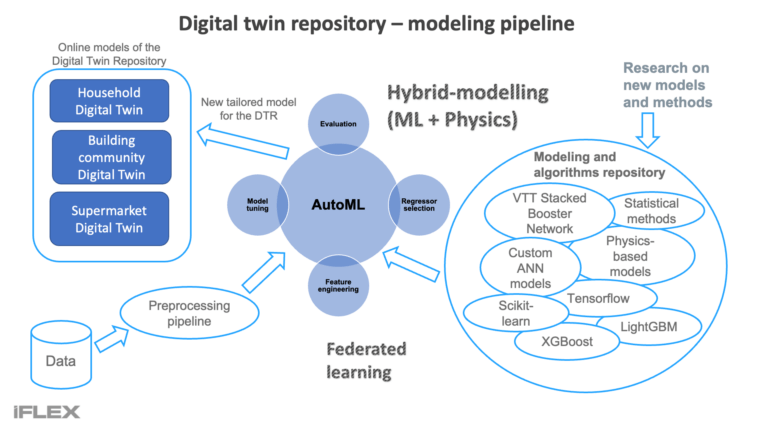Result description
The framework effectively integrates and manages building energy systems by unifying data and control access across Home Energy Management Systems (HEMS) and Building Energy Management Systems (BEMS). It enables creation of digital twin models for optimized control and accurate forecasting of energy consumption and flexibility. This enables automated and efficient control of flexible assets, enhancing energy efficiency, market participation, and power grid balancing. The framework’s security module ensures secure data communication and access control, providing robust trust and privacy mechanisms. Overall, it supports local energy optimization and both implicit and explicit demand response strategies.
Addressing target audiences and expressing needs
- Business partners – SMEs, Entrepreneurs, Large Corporations
Market Expansion and Customer Acquisition: We aim to expand to more markets and find new customers to implement the ecosystem, targeting energy communities, cooperatives, energy aggregators, and ESCOs.
Innovation and Research Collaboration: We seek collaborators and business partners for the further development of the ecosystem through innovation activities and research initiatives.
- Public or private funding institutions
- Other Actors who can help us fulfil our market potential
- Private Investors
R&D, Technology and Innovation aspects
Framework tools have been tested in various pilots in Greece, Slovenia and Finland with a diverse range of building types.
The framework is designed with scalability in mind, making it adaptable to a wide range of building types and sizes. Its modular architecture allows for seamless integration with HEMS/BEMS, regardless of the complexity or scale of the building infrastructure. The use of standardized interfaces, such as RESTful APIs and MQTT communication, ensures that the framework can easily expand to accommodate additional buildings and systems.
Digital twin models can be customized to reflect the unique characteristics of each building, ensuring accurate and efficient energy management. The successful deployment in diverse pilot projects in Greece, Slovenia, and Finland showcases the framework’s ability to be replicated across different geographical regions and building infrastructures, proving its versatility and adaptability.
The framework promotes sustainability by optimizing energy use and enhancing the efficiency of building management systems. The digital twin models enable precise forecasting and control, allowing for the efficient balancing of energy supply and demand.
- Europe
Result submitted to Horizon Results Platform by CAVERION SUOMI OY

